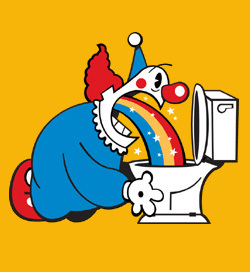
I first posted this piece last summer, but knew I had to revive it when I got a great request from ChronicBabe for posts on the theme of chronic illness and humor:
Last week, I was interviewed in a Newsweek article about young adult cancer humor. I’m, not a very funny person. I’m just not. Don’t worry, I’m not being harsh on myself. I think I’m smart, compassionate, and fairly attractive. But, I’m just not very funny.
I love to laugh, but my humor is particular, maybe even stubborn. I can’t rent dvds from the comedy section; I just don’t find them funny. Nor do I find cancer jokes very funny. So, it was really hard when Newsweek asked me to contribute some jokes to the blog that accompanied the article. Here’s what I sent:
*What do you call a young adult cancer patient with health insurance? A Canadian.
*Why did the cancer patient cross the road? He wanted to get hit by a truck.
These jokes are the best I could do.
I’m not above cancer humor, and I’m not particularly politically correct. I just have a hard time laughing at something that has killed a lot of people I love, and caused me and my family enormous pain and distress. I have plenty of laughter in my life. But I don’t want or need it to come from my illness.
Jill Harrison, a young survivor in the article said she feels humor can be a cover up for issues we have a hard time talking about. I agree. (Though I see exceptions, like Heidi Adams who is both a total jokester and very real about hardcore cancer issues.)
I find it strange that cancer is something people often relate to through humor. Why is that? I never hear people cracking jokes when someone says their dad died of a brain anurism, or that their apartment was charred in a fire. Yet humor seems almost like a branded expectation put on oncology patients.
I feel like the cancer community often dumbs me down, like I need a little slap stick song and dance routine to make it through. And as a result, I see very little time devoted to the the hardest conversations of it all. Did you know that almost 1 in 4 young adult cancer patients won’t make it? How many resources are there talking about end-of-life care for young adults? Almost zilch. And that’s not funny.
When we start actually addressing the really, really hard side of cancer, maybe then I can start laughing about the rest of it. But probably not. I think cancer might always be serious to me. Instead, I’ll spend my time laughing at Cake Wrecks. Yeah, I do find some things funny. Just not cancer.
What is your take? Do you laugh at your illness? Is it ever nervous laughter or good medicine? If you have a disease other than illness, do you find that humor and light-heartedeness is used in your patient community?
![]()
![]()

 “Everything Changes is, without doubt, the most forthright, emotionally sophisticated, and plain-old valuable book of its kind I've seen.”
“Everything Changes is, without doubt, the most forthright, emotionally sophisticated, and plain-old valuable book of its kind I've seen.”












